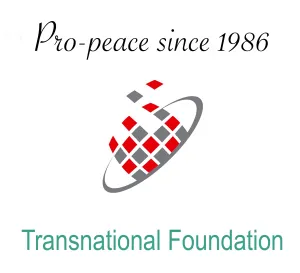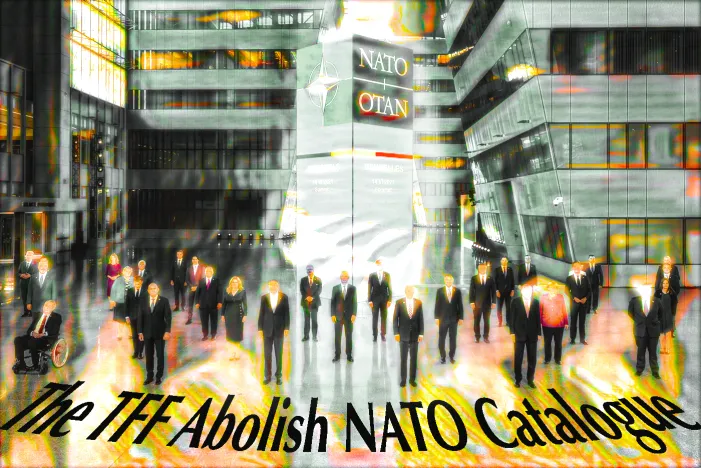The Abolish NATO Catalogue
NATO, 8 Jul 2024
Jan Oberg and TFF Associates | The Transnational - TRANSCEND Media Service
******************************
From NATO’s Website:
NATO Summit Marking 75 years of the Alliance, 9-11 Jul 2024
Seventy-five years ago, 12 countries signed the North Atlantic Treaty in Washington, D.C. to ensure their collective defence in an unpredictable world.
This year, 32 NATO Allies will meet again in Washington, D.C. to make key decisions on how to continue to protect their one billion citizens as the world faces the most dangerous security environment since the Cold War.
******************************
Abolish NATO or Convert It to Serve Peace – 30 Arguments & 100s of Inspirations
Download as PDF: AbolishNATOCatalogue
Executive Summary
This catalogue contains 30 arguments for the abolition of NATO. Each argument is based on rational peace research analysis, in contrast to the fact-resistant propaganda that NATO and mainstream politics and media promote about the ’defensive’ peace alliance.
The Catalogue is based on the democratic assumption that diverse perceptions and concepts can exist – for instance, about what peace is – and that this hugely influential Western organisation is not sacrosanct and shall, therefore, not be exempt from critical analysis.
While set up in 1949, NATO passed its ”best before” date long ago. The alliance of 30 members and 40 partners has not been able to create the peace that is its overarching goal according to its founding treaty. Indeed, NATO violates that treaty on a daily basis.
Instead, with its expansion over the last 30 years, it has contributed to making the world a less peaceful place. The Ukraine tragedy – for which both NATO and Russia are responsible – speaks volumes about that sorry state of affairs in Europe but also beyond it.
Europe is now in the Second Cold War thanks to all major parties’ adherence to the primacy of weapons in deterrence mode instead of common security thinking and intelligent conflict-resolution as a road to peace. One by one, all the opportunities for a new European peace structure that arose when the Soviet Union and the Warsaw Pact dissolved have been squandered.
•
Most people focus on the violence – the war – in Ukraine. Undoubtedly, Russia is responsible for that and for violating international law. But what we should focus much more on is the underlying conflict. Violence always manifests itself and grows out of conflicts, conflicts that have been ignored, mismanaged, escalated, or provoked. NATO and its three-decades-long expansion, its presence in Ukraine since 1991 and its insistence – no matter the warning and the objective risks – to get Ukraine into NATO is the underlying conflict. NATO must take responsibility for that.
Because, as the Catalogue also argues, there were alternatives. But they were deliberately ignored.
•
Focus on conflict analysis and conflict understanding – and not on the violence – is the key to peace: What is the issue or problem that stands between the parties – not who is evil or guilty and should be punished?
The focus on violence and who is to blame is psychologically understandable – but for true, professional peace-makers, it is a waste of time and usually contributes to justifying more violence.
When the violence has died down, and a sustainable solution is found, legal processes may deal with guilt and crimes, but so may also new arrangements, truth commissions, forgiveness and reconciliation. These methods are all within our human capacity but – tragically – almost never found in security politics. NATO promotes none of them.
The fact is that we know more about the causes of violence and war than about the causes of peace. But that must not serve as an excuse for continuing the wrong conflict- and violence-promoting policies.
That said, there is enough research on the causes of violence reduction and peace for us to say that they are not what NATO promotes.
Its fundamental principles of deterrence, (forward) defence and its reliance on first-use of nuclear weapons will never lead to real peace, but they have brought us closer to war, including nuclear war.
•
NATO’s intellectual foundation concerning security and peace appears in inverse proportion to its military and political power.
Much of this report can be seen as a critical discussion of the alliance’s way of thinking – of its security Groupthink. It questions, even debunks, NATO’s conceptual and theoretical underpinnings and shows how out of date, contradictory and peace-preventing they are.
NATO defends them on its homepage in its conspicuously self-righteous propaganda piece called ”Setting the Record Straight” from July 2022. Part of it is fake, part of it convenient omissions – a cover-up for issues about NATO policies that ought now to be pushed up to the top of the international discourse about humanity’s future.

In addition, NATO employs a cover-up disinformation trick typical of our times. Instead of meeting criticism with an open mind and in a sound democratic spirit, it says that ”Since Russia began its aggressive actions against Ukraine, Russian officials have accused NATO of a series of threats and hostile actions.” Not so! Many of the points have been raised for years by intellectuals, diplomats, alternative media and civil society organisations, including TFF.
But tie them to Russia and – hocus pocus – critiques of the alliance are all implicitly transformed into Putin Verstehers, Putin lovers or “pro-Russian.”
That in itself indicates NATO’s intellectual level. A few billion people around the world do not subscribe to NATO’s so-called peace goal or the way it seeks to go about it. The present author, a professional peace and conflict researcher with 40+ years of experience in theory and on-the-ground work, is one of them.
It is perfectly possible to be critical of NATO’s activities without being categorised as guilty by fake association with its adversaries.
If not, NATO seems to have become a sort of secularised religion in a time when things are otherwise falling apart. Sacrosanct – for which reason all criticism equals ungodliness. This Catalogue discusses that interpretation too, and NATO Believers may see that as ’ungodly.’
Instead of conducting serious research and using scenario techniques to decide its policies, NATO merely makes postulates – about others, about its policies and how others ought to interpret it – favourably. NATO doesn’t seek to convince by rational analyses and arguments. NATO issues strategies, planning papers and summit minutes that are filled with postulates and serve as NATO scriptures.
Western mainstream media reports it all. Not a critical thought to be seen anywhere. They are members of the congregation.
For people who are not already NATO Believers, members of that congregation, NATO’s threat postulates appear to serve only one purpose, namely to support the imperial full-spectrum global dominance of the US and some alliance members and partners and legitimise NATO’s further armament, i.e. the Military-Industrial-Media-Academic Complex (MIMAC).
The overall goal for NATO has not been the security and peace of Ukraine, Russia and NATO Europe. It’s been to prevent Russia from being Ukraine’s partner and feel secure and to possess Ukraine fully. No compromise, no creative thinking about Ukraine as a cooperative project, no respect for public opinion in Ukraine. No idea about common security for all.
If you are not a NATO Believer, you’ll find ample evidence that Russia’s legitimate concerns have been ignored for about 30 years.
Promises indeed given to Russia in 1989-90 have been broken, even after Gorbachev and the Soviet Union had accepted that East and West Germany not only would be unified but also became a full member of NATO with no discussion of the nuclear weapons in Europe. It all happened on US and NATO’s premises while giving money to Russia – then on its knees – to force it to accept the fait accompli.
Furthermore – and what few know about – NATO has turned down all Soviet/Russian requests to become a member.
NATO’s argument that it respects all countries’ fundamental right to choose its own path, also when it comes to security arrangements, is simply fake. NATO woos prospective members in many ways, from an early moment (Ukraine since 1991), discussions about alternatives to NATO membership are non-existent.
At no point between 1991 and the end of 2021 was there any majority for NATO membership among the Ukrainian people, only among an elite, President Poroshenko’s in particular. When NATO decided in 2008 to make Ukraine a member, half of the Ukrainians were opposed to Ukraine’s membership in NATO, while fewer than one-fourth of Ukrainian people supported the Euro-Atlantic integration. So, whose right to freely choose? They – like all other new NATO members – were never granted a referendum.
•
The table of content that follows offers the 30 arguments categorised in seven themes – see the headlines A to G.
By way of ending this summary, let’s point out that NATO’s resource consumption – 12 times larger than Russia’s and increasing further – is out of place in a world struggling with saving humanity in record time before it is too late. The 2% of GDP goal for NATO’s future-secured militarism is intellectual bonkers.
NATO postulates who and what threatens it. It doesn’t explore opportunities for compromise or cooperation and does explain or argue. It exaggerates these threats to achieve even more superiority in what are fundamentally a-symmetric conflicts.
NATO is called ’defensive’ everywhere. It reveals that nobody knows the difference between offensiveness and defensiveness, a basic distinction in security discourses. It is pure public relations propagated by media people who are better at taking orders than reading books.
One thing is that NATO cannot and will not respect the new Nuclear Ban Treaty. Another is that its argument is that as long as nuclear weapons exist, it will remain a nuclear alliance. Think through the logic of that once more!
It’s easy to criticise. However, a doctor should move through diagnosis and prognosis and get to treatment – and not just criticise the patient for the disease. So Arguments 23-25 illustrate what could have been done instead to deal with Ukraine so that both Ukraine, Russia and NATO could have lived much more happily – and peacefully – than they do now.
NATO did have alternatives and could have done things differently. If securing peace had been the goal.
The final theme about NATO’s future draws up the gathering dark clouds, the alliance’s past and future cracks, and how ill-prepared it is for the world order change that takes place in the eyes of everybody else but the NATO Believers. It also argues that the Western knee-jerk, emotionalist and hateful and disproportionate reaction to Russia’s invasion of Ukraine will prove extremely counterproductive for these countries themselves and for NATO as well as accelerate the relative decline of the West.
TO CONTINUE READING the REPORT Go to Original – transnational.live
 __________________________________________
__________________________________________
 Submitted by TFF Director, Prof. Jan Oberg, a member of the TRANSCEND Network for Peace Development Environment.
Submitted by TFF Director, Prof. Jan Oberg, a member of the TRANSCEND Network for Peace Development Environment.
The Transnational Foundation for Peace and Future Research, TFF in Lund, Sweden is independent of government and corporate funding and thus conducts truly free research. Thanks to its 60 expert Associates around the world, it has a well-respected capacity from on-the-ground conflict analysis and mediation work in places such as Georgia, ex-Yugoslavia, Israel-Palestine, Iraq, Burundi and Iran. Since 1986 TFF has worked for the UN Charter goal of peace by peaceful means. TFF produces truthful, comprehensive analyses and critiques the exaggerated use of violent means. That’s diagnosis and prognosis. But we also do treatment because the world will not become a better place without constructive dialogue and ideas. TFF@transnational.org
Tags: Anti-NATO, Anti-hegemony, Anti-imperialism, Anti-militarism, Demilitarization, NATO, OTAN, UK, USA, War Economy, Warfare, West, Youth against NATO
DISCLAIMER: The statements, views and opinions expressed in pieces republished here are solely those of the authors and do not necessarily represent those of TMS. In accordance with title 17 U.S.C. section 107, this material is distributed without profit to those who have expressed a prior interest in receiving the included information for research and educational purposes. TMS has no affiliation whatsoever with the originator of this article nor is TMS endorsed or sponsored by the originator. “GO TO ORIGINAL” links are provided as a convenience to our readers and allow for verification of authenticity. However, as originating pages are often updated by their originating host sites, the versions posted may not match the versions our readers view when clicking the “GO TO ORIGINAL” links. This site contains copyrighted material the use of which has not always been specifically authorized by the copyright owner. We are making such material available in our efforts to advance understanding of environmental, political, human rights, economic, democracy, scientific, and social justice issues, etc. We believe this constitutes a ‘fair use’ of any such copyrighted material as provided for in section 107 of the US Copyright Law. In accordance with Title 17 U.S.C. Section 107, the material on this site is distributed without profit to those who have expressed a prior interest in receiving the included information for research and educational purposes. For more information go to: http://www.law.cornell.edu/uscode/17/107.shtml. If you wish to use copyrighted material from this site for purposes of your own that go beyond ‘fair use’, you must obtain permission from the copyright owner.
One Response to “The Abolish NATO Catalogue”
Join the discussion!
We welcome debate and dissent, but personal — ad hominem — attacks (on authors, other users or any individual), abuse and defamatory language will not be tolerated. Nor will we tolerate attempts to deliberately disrupt discussions. We aim to maintain an inviting space to focus on intelligent interactions and debates.

Prof. Jan Oberg says “This year, 32 NATO Allies will meet again in Washington, D.C. to make key decisions on how to continue to protect their one billion citizens as the world faces the most dangerous security environment since the Cold War.”
My question is “which one million?” because the planet has nearly 8 million. Another question: what value does it argue “rational peace research analysis”, when the people who run governments, UN and NATO, spend the time in office arguing “rational war research analysis?”
I expect Prof. Oberg, coming from Sweden,will u0nderstand what I’m saying, for Sweden is one the main countries in the world involved in the savage War industry and corrupt selling strategies.